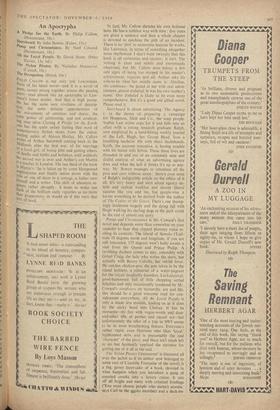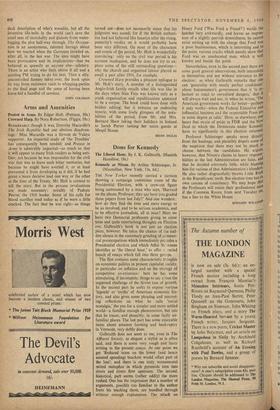An Apocrypha
Storyboard. By John Bowen. (Faber, 15s.) PHILIP CALLOW is our only real Lawrentian. Parts of his latest novel—and it is a novel of Parts, scenes strung together across the passing Years—read almost like an apocrypha to Law- rence's lesser stories. And that is high praise. He has the same sure vividness of descrip- tion, the same delicate apprehension of the movements of emotion and desire, the same power of celebrating, and not cerebrat- ing, man alive. Closing A Pledge for the Earth. one has the quite unfair feeling that most of contemporary fiction stems from the onion- Peeling antics of Aldous Huxley. Mr. Callow writes of Arthur Satchwell coming back to the Midlands after the first war, of his marriage io, a local girl, of losing jobs and getting others, Of deaths and births and holidays, until suddenly the second war is over and Arthur's son Martin a teacher in London. The last third of the book li Martin's : he is taken up by some Hampstead 4°Pllisticates and finally settles down with the \\life of one of them in a cottage, a father now himself and a writer. This shift of attention re- gisters rather abruptly : it tends to make one think of the brilliant early vignettes as no more than preparatory, or would do if this were that 'nil of book. ' In fact, Mr. Callow dictates his own fictional laws. He has a ruthless way with time : five years arc given a sentence and then a whole chapter is devoted to catching the pith of an incident. There is no 'plot' to anatomise because he works, like Lawrence, in terms of something altogether more rhythmical. I don't want to. imply that this book is all certainties and success: it isn't. The writing is clear and subtle and enormously observant, but Mr. Callow does betray a few odd signs of, being too steeped in his master's achievement, vagaries and all. Arthur asks his wife-to-be what her middle name is: Ottoline, she confesses----'he gazed at her with real aston- ishment, almost disbelief. It was his own mother's name.' Our disbelief is likely to be even more comprehensive. But it's a good and gifted novel. Please read it.
Storyboard is about advertising. The Agency in the throes of preparing a campaign for Hoppness, Silch and Co., the soap people. Sophia Last writes copy -for it and falls into an affair with a young research graduate Ralph. now employed by a hard-hitting weekly journal of the Left. Hugh, her Group Head, lives a bumbling bachelor life with three dachshunds. Keith, the account executive, is having trouble with his bored wife Sylvia. These three lives are threaded in and out of an extremely neat and skilful analysis of what an advertising agency does and what the hell it thinks it's up to any- way. Mr. Bowen manages to introduce all the pros and cons without strain : there's even most of Ralph's indigestible article on the ethics of it all. It's very funny and alert about agency de- tails and radical weeklies and decent liberal squares like you and me, but people-wise it leaves something to be desired froiln the author of The Centre of the Green. There's one thump- ingly irrelevant tragedy and the dying fall with Hugh walking his darling dogs in the park could be the end of almost any story.
Pomp and Circumstance is Mr. Coward's first novel and depends more than somewhat on your capacity to hear that clipped plummy voice re- citing its contents. The island of Samolo ('Lati- tude -18 degrees north and longitude, if you are still interested, 175 degrees west') hotly awaits a visit from the Queen and Prince Philip. A ravishing duchess comes to stay, ostensibly with Grizel Craig, the lady who writes the story, but actually with Bunny Colville, her rakish lover. He catches chicken-pox, she gets taken, in by the island lesbians, a rehearsal of a water-pageant for the royals laughably founders. Lackadaisical, good-humoured, full of little chopping verbal felicities and only occasionally lumbered by Mr. Coward's sintp/e.s-ses on monarchy, sex and life, this should be a good winsome read for con- valescents everywhere. All the Loyal People is only a shade less modish, leading us as it does by the sticky hand into Chelsea. It has its moments—sly fun with vogue-words and dust- and-ashes tilts at parties and casual sex—but unfortunately the offer of a trip to SW3 seems to be its most breathtaking feature. Everyone's rather vapid, even Harrison who likes 'loyal,' hyphenated debs and is presumably the real 'character' of the piece, and there isn't much left to do but hesitantly applaud the narrator for getting out of it all at the end.
The Nylon Pirates ('monsarrat' is blazoned all over the jacket as if its author now belonged to
some sort of COmedie Francaise of the novel) is a big, gooey layer-cake of a book, devoted to What happens when you introduce a gang of assorted crooks into a luxury cruise. It sets off all bright and nasty with criminal briefings (`You must choose people who daren't scream,' says Carl to the gigolo member) and a deck-by- deck description of who's wooable, but all the inventive life-belts in the world can't save the cruel seas of incredulity and distaste from water- logging the plot half-way through. The Occupa- tion is an anonymous, talented farrago about how we reacted when the Germans invaded us, after all, in the last war. The idea might have been provocative and its implications—that we behaved as queasily as anyone else—salutary. There is an artist who feels above it all and a quisling PM trying to do his best. Then a silly, uncontrolled fantasy takes over, the book spins its way from resistance raids to whipping-parties to the final page and the sense of having been force-fed a handful of sawdust.
JOHN COLEMAN















































 Previous page
Previous page